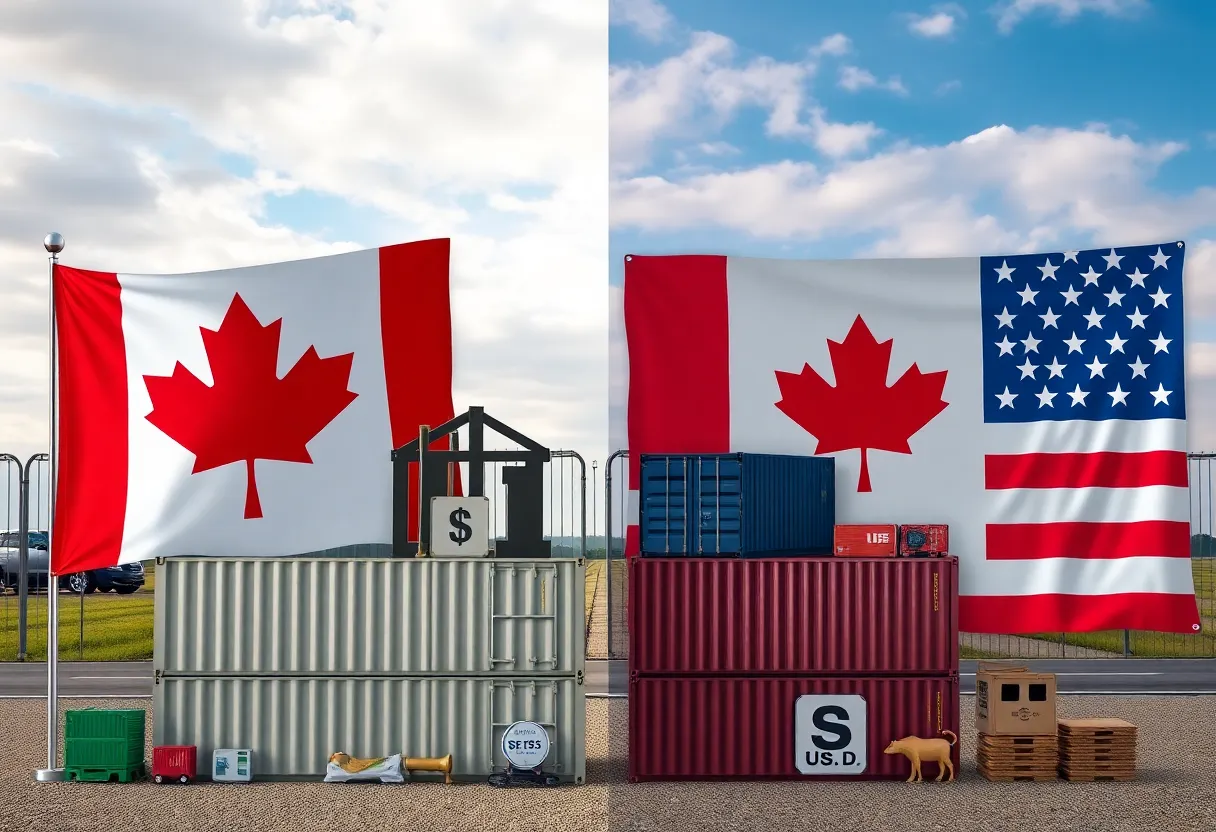

Illustration depicting Canada and U.S. trade relationships amidst looming tariffs.
As President-elect Donald Trump’s inauguration approaches, Canada is implementing a three-stage plan to counter potential tariffs from the U.S. Aiming for targeted responses, Canadian officials are focused on goods that might stir political reactions in Republican and swing states. The proposed tariffs could significantly impact vital sectors, leading to potential job losses and economic decline. The future of U.S.-Canada trade relations is uncertain, with both nations facing significant economic interdependencies.
As the clock ticks down to the inauguration of President-elect Donald Trump, the Canadian government is launching a **bold** three-stage plan to counteract potential tariffs that may slam Canadian imports with a whopping **25%** charge. If Trump follows through on these tariffs, it could affect around **37 billion Canadian dollars**, equating to about **$25.6 billion** in consumer products flowing from Canada to the U.S.
Canadian officials are carefully choosing which items to hit with tariffs, and they’ve got politics in mind! Instead of just picking any usual products, they’re focusing on those that are likely to cause a stir in **Republican** and **swing states**. This strategy aims to apply the right kind of pressure where it matters most. It’s all part of Canada’s plan to make sure that Americans really understand the costs of what’s being dubbed the “**Trump tariff tax**.”
The ripple effects of these potential tariffs could extend far and wide. Sectors like **autos**, **lumber**, and **oil** are in the crosshairs, sparking fears about job losses in these critical areas. Not to mention that Canada is crucial for 36 U.S. states, with goods valued at **$3.6 billion Canadian (US $2.7 billion)** crossing the border every single day. So, this isn’t just a matter of trade; it’s a matter of jobs and economies interlinked on both sides of the border.
If the tariffs go through, the list of goods facing Canadian tariffs includes items like **orange juice**, **toilets**, and even certain **steel products**. Now, that’s quite a mix! Former government officials have emphasized that Canada must consider a **painful dollar-for-dollar** response to truly hit back hard.
As terrifying as it sounds, economic experts are warning that Canada’s GDP could shrink by up to **2.6%** if those tariffs are imposed. Over in the U.S., they might see a decline of **1.6%**. The repercussions wouldn’t stop at the borders: analysts estimate that if things go south, we might see around **500,000 job losses** in Ontario’s auto sector alone, and **50,000** in Alberta.
Canadians are no strangers to retaliatory measures. Back in **2018**, Canada imposed **10%** duties on yogurt and whiskey from states represented by prominent Republicans. Now, the government is considering a similar path if the anticipated tariffs come into play.
In light of the looming threat, Prime Minister **Justin Trudeau** has made it clear that Canada will respond as a **unified front**, providing support for sectors that could face fallout. Amid all this, the idea has popped up of leveraging **energy exports** as a bargaining chip. However, there’s mixed feelings about this approach; while Alberta’s Premier is not a fan of using energy as a negotiation tool, other provincial leaders are open to the idea.
Canadian Foreign Minister **Mélanie Joly** has been actively meeting U.S. senators to voice these concerns. Interestingly, many American senators have already expressed their worries about how these tariffs could end up hurting American jobs, too.
As we watch the political drama unfold alongside the impending inauguration, it’s clear that U.S.-Canada trade relations are entering a **fragile phase**. With both countries highly intertwined economically, the coming months could very well be crucial for the future of trade, jobs, and economic stability on both sides of the border. Everyone’s eyes will be glued to how this situation evolves because, at the end of the day, it’s about **more than just tariffs**—it’s about our shared prosperity.
News Summary Texas is gearing up for a stormy week as a classic springtime weather…
News Summary Todd Dale Merriam, owner of Merriam's Midway Shows, faces 26 felony counts of…
News Summary Two drive-by shooting incidents at Joint Base San Antonio-Lackland on Saturday morning alarmed…
News Summary An 18-year-old woman was critically injured in a shooting on April 2, 2025,…
News Summary San Antonio has unveiled Unhireable Coldbrew & Cocktails, a hybrid venue combining a…
News Summary San Antonio is facing potential economic shifts as businesses brace for new tariffs…